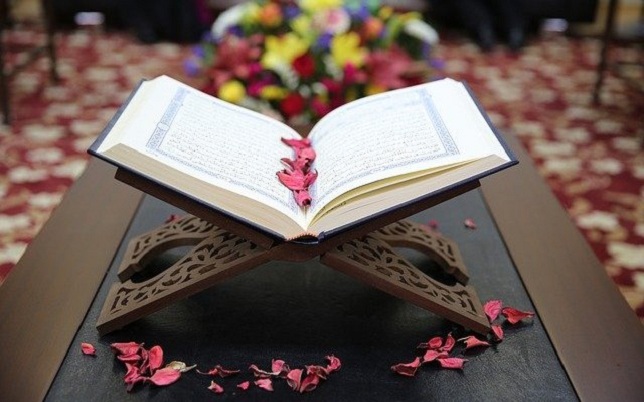Pillars of Islam are those essentials and fundamentals of Islam which are absolutely necessary to be accepted and followed by a person to called a Muslim. The most important obligation upon a Muslim is to learn about those things in which he has to believe and those which he has to practice.
These tenets or pillars of Islam are fundamental in order for a person to qualify as a Muslim. They are commonly shared by Muslims throughout the world and are as follows:
1. Imaan (Faith)
2. Salah or Namaz (Prayer)
3. Sawm (Fasting)
4. Zakat (Poor Due)
5. Hajj (Pilgrimage)
Value of Faith in Islam
Islam places supreme importance on correctness of faith.
If a person’s faith is incorrect, his deeds and even his worship are not acceptable to Allah. But if his faith is correct, even a small number of good deeds may suffice for his eternal salvation.
If one denies the obligatoriness of any of these pillars, he ceases to be a Muslim.
If a person forsakes them permanently, he too is considered as one dissociating himself from the group of Muslims.
In this post we are going to learn about the five pillars of Islam which are known as Arkan al Islam.
Contents
First Pillar of Islam – Tawheed
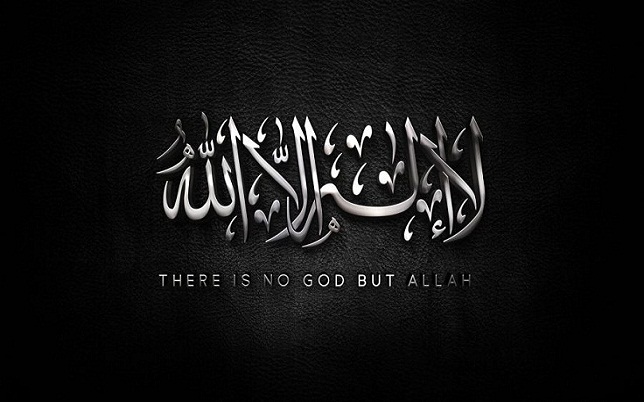
Belief in Oneness of Allah is the first and foremost tenet of the Islamic faith. It does not leave any space for an intermediary between the worshipper and his Lord in matters of worship and supplication.
Islam totally prohibits beliefs such as the diversity of gods, or in the existence of a person as God’s reflection, or in God merging with any of His creatures to become one with him.
Instead, in Islam a believer clearly confesses that there is no god but Allah, the Almighty, the Independent.
He has no father, no son, and no associate of any kind.
He alone is the Creator of the universe, exercises complete administration of the world, and holds full control of the land and the sky. He does not need help from anybody.
Allah has always existed and shall exist for ever. His attributes are perfect, worthy of praise and glory. He is above all limitations and weaknesses, whatsoever. His knowledge encompasses all and everything.
He alone deserves worship, the highest manifestation of reverence.
There are many important componenets of Faith in Islam such as Belief in Oneness of Allah, Prophets Of Allah, The Judgement Day, Books of Allah, Angels etc. which are required to be believed with conviction by a Muslim.
Recommended articles on various Islamic beliefs:
- Most Important Islamic Beliefs about Allah
- Most important Islamic beliefs about Messengers and Prophets of Allah
- Most important Islamic beliefs about Quran, the Book of Allah
Now let us understand the second pillar of Islam known as Salah or Namaz which is an obligation upon a Muslim to offer 5 prayers daily.
Second Pillar of Islam – Salah (Namaz)
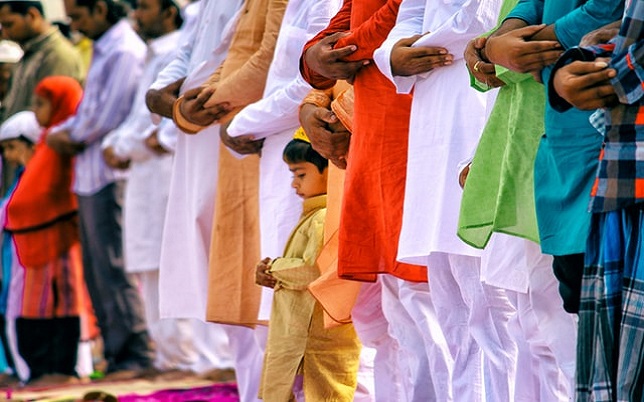
Of all forms of worship in Islam, Salah, prayers offered five times a day, is of foremost importance.
It is a fundamental pillar of Islam and a practice distinguishing Muslims from followers of other religions. In view of its importance it is considered as a line of demarcation between Islam and all other unlslamic ways of life.
Allah commands the believers in Quran:

“(Set your face to the Faith) turning totally towards Him, and fear Him, and establish Salāh, and do not be among those who associate partners with Allah”. [Quran 30: 31]
The Prophet of Allah, blessings and peace be upon him, also emphasizes the importance of Salah in the following words:
Renouncing Salah (Prayer) is ( a line of demarcation) between (Allah’s) slave and infidelity.
In another statement of Prophet Muhammad the same theme has been underscored in these words:
“The line of demarcation between Faith and infidelity is renouncement of Salah (Prayer)“.
Salah safeguards faith and leads to ultimate salvation. Allah has mentioned it as a basic condition for His guidance and a sign of piety on the part of a Muslim.
Salah is obligatory on all Muslims, free or slave, healthy or sick, resident or traveller, and has to be offered in all conditions.
If a Muslim is unable to stand up. he should offer his prayers sitting. If unable to sit, he is allowed to pray in a reclining or prostrating posture. If even this is not possible for him, he can pray by gestures. But he must pray.
Muslims are required to pray even in the battlefield (which is done in a specific way and is known as Prayer of Fear (Salatul Khawf).
They also pray while undertaking a journey, although for their convenience in the journey all four- Rak’ah obligatory Salah are reduced to two-Rak’ah Salah.
Salah is so important and fundamental that even a Prophet is not exempted from it. It is to the believer what water is to the fish. It accords shelter and peace to the believer.
If offered with due sincerity, it never lets a believer stoop down to the worship of a false god, accept a lifestyle of ignorance, or adopt any immoral behaviour. Allah states in the Quran:

Recite, [O Muhammad], what has been revealed to you of the Book and establish prayer. Indeed, prayer prohibits immorality and wrongdoing, and the remembrance of Allah is greater. And Allah knows that which you do. [Quran 29: 45]
Salah is offered five times a day and has to be said at specified times as ordained by Allah. The number of Rak ‘ahs performed in Salah is also fixed and has to be observed without any alteration.
Following are the recommended posts on various aspects related to Salah. Interested reader can go through them for further information on second pillar of Islam.
- Importance and Meaning of Azan in Islam
- Importance of Friday Prayer (Juma Salah) in Islam
- Translation of the meaning of Friday Sermon (Juma Khutba)
Now lets move on to the third pillar of Islam which is known as Sawm or Fasting in the month of Ramadan.
Third Pillar of Islam – Sawm (Fasting)

The divine commandment for Fasting was revealed after the Hijrah (Emigration from Makkah to Madinah) when Muslims were set free from oppression, poverty and indigence that they had experienced at the hands of people of Makkah and started living in Madinah in ease and comfort.
Had the order for Fasting (Sawm) been given at Makkah, people might have related it to the Muslim’s resourcelessness and stringency during their stay there.
They could have developed a feeling that Fasting was for the poor, the indigent, the sufferer, and the oppressed and that the rich and the well-to-do, the owners of the gardens and lands were, perhaps, not the real addressees of this commandment.
The verses of the Quran which contain the order for Fasting as an obligatory duty for Muslims are as follows:

O you who believe, the fasts have been enjoined upon you as they were enjoined upon those before you, so that you may be God-fearing.
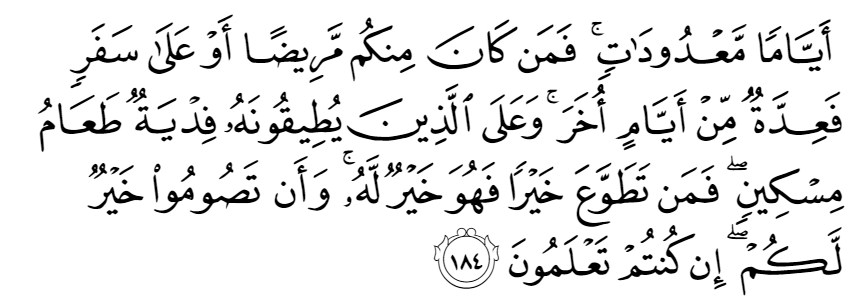
(Fasting is) for days few in number. However, should any one of you be sick or on a journey, then (he should fast) a number of other days (equal to the missed ones);
and those who have the strength, (still, they do not opt for fasting,) on them there is a fidyah (compensation), that is, the feeding of a poor person.
Then whoever does good voluntarily, that is better for him. However, that you fast is better for you, if you only knew.
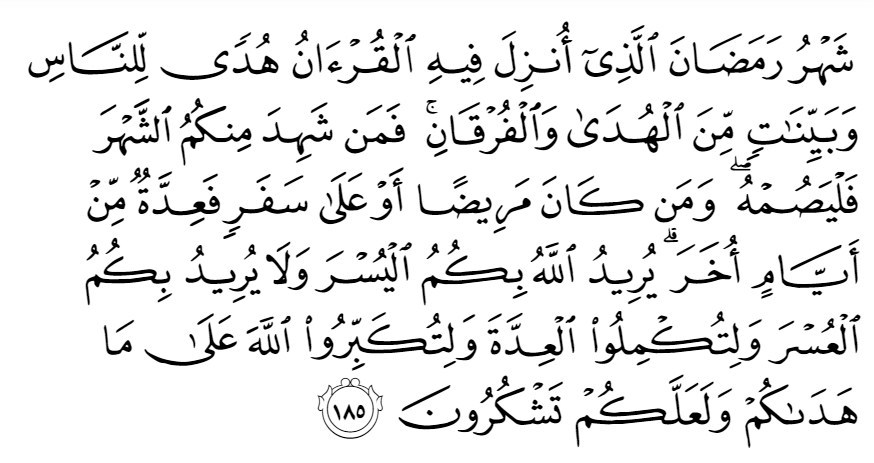
The month of Ramadan is the one in which the Qur’ān was revealed as guidance for mankind, and as clear signs that show the right way and distinguish between right and wrong.
So those of you who witness the month must fast in it. But the one who is sick, or is on a journey (should fast) as much from other days (as he missed).
Allah intends (to provide) ease for you and does not intend (to create) hardship for you.
All this is so that you may complete the number (of fasts as prescribed) and proclaim the Takbīr of Allah for having guided you, and (so) that you may be grateful.
These verses, which announce the obligatoriness of Fasting (Sawm) for the first time, do not lay down dry laws concerning Fasting which may be noticed in the case of man-made laws existing, for example, between the citizens and the ruler of a state.
Islamic laws, instead, appeal to the belief and faith, reason and conscience, heart and soul at the same time and prepare Muslims to take the commandment for Fasting as a most welcome tenet of religion, not as a dictate of law.
This is, in fact, an undeniable miracle of the Quran’s principles of calling to the Truth and its ability to formulate prudent and psychologically sound laws.
Recommended Reading : Prophet Muhammad’s Special Lecture before Ramadan
Objective of Fasting
The objective of Fasting is to discipline and reform the believers, not to put them to hardship.
Fasting, in fact, serves as a medium of moral training helping Muslims to rise to a level of moral and spiritual perfection where they learn to control their desires and deal as masters with them, not as slaves.
If they develop a moral strength to give up desirable things such as cool water and tasteful food from dawn to dusk to observe Fasting, will they not then try to stay away from things forbidden by Allah?
The following posts explain about the various aspects related to fasting in Ramadan. Interested reader can go through them for further information on third pillar of Islam.
- Islamic Philosophy and Wisdom of Fasting in Ramadan
- Benefits of Eating Sehri (Pre-Dawn Meal) in Ramadan
- What is Eid ul Fitr and Eid ul Azha in Islam?
Now lets understand the fourth pillar of Islam which is known as Zakat or Poor Due.
Fourth Pillar of Islam – Zakat (Poor Due)

In the Quran Zakat (Poor-due) hass been mentioned together with Salah (Prayer) at eighty-two places.
Also, wherever in the Quran the qualities of believers are described, their eagerness for establishing Prayer and Poor-due is mentioned together.
The Prophet of Allah (blessings and peace be upon him) has mentioned Zakat as a fundamental tenet of Islam.
When once asked what Islam was, Prophet Muhammad replied:
“Worship Allah and do not ascribe any partner to Him, establish obligatory Salah (Regular Prayers), pay Zakat (Poor-due), and observe Sawm (Fasting) in Ramadan”.
(Bukhari and Muslim)
Muslim scholars are of consensus that Zakat is obligatory on Muslims like Salah and Muslims have been sincerely observing the pratice of paying Zakat throughout the history of Islam.
Allah has mentioned performance of Salah and giving of Zakat as signs of a believer’s correct faith, obedience to his Lord, peace with Him, and feeling of brotherhood for Muslims in general.
It is stated in the Quran:

But if they repent and establish regular prayers and practice regular charity, then open the way for them: For Allah is Forgiving, Most Merciful. [Quran 9: 5]
The same theme is stated again at another place in the Quran in these words:

“But (even so), if they repent, and establish regular prayers, and practice regular charity, — they are your brethren in Faith: (Thus) do We explain the signs in detail, for those who understand”. [Quran 9: 11]
Articles on which Zakat is to be Paid
The Prophet of Allah, blessings and peace be on him, prescribed the percentage of Zakat, mentioned the things for which Zakat had to be paid and laid down the conditions in which it became obligatory. He divided such things into four categories:
- Produce of cultivation and garden
- Cattle (camels, cows, goats, etc.)
- Gold and silver, which are the bases of the whole financial system
- Commercial articles of all kinds.
Zakat is a Form of Worship, Not a Penalty
It should be remembered that Zakat is not a tax or a penalty imposed by a state. It is an act of worship like Salah (Prayers) and Sawm (Fasting) and is a means of securing Allah’s approval as well as moral discipline and refinement.
Recommended Reading: Wisdom and Philosophy of Zakat in Islam
Now we will learn about the final fifth pillar of Islam which is known as Hajj or Pilgrimage.
Fifth Pillar of Islam – Hajj (Pilgrimage)
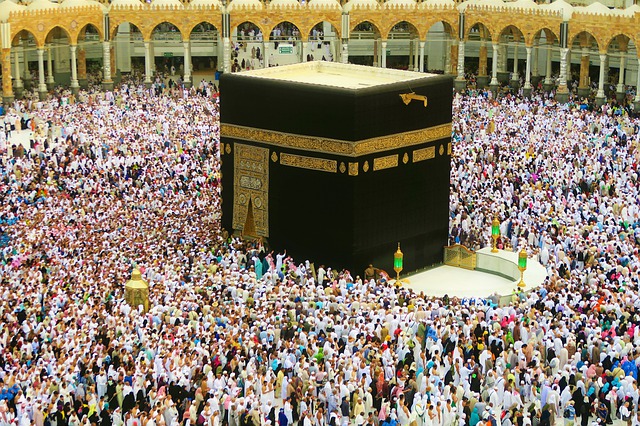
Hajj (Pilgrimage) is the fifth pillar of Islam. If a Muslim does not perform Hajj in spite of his ability to perform it, he may be considered a renegade according to some Quranic verses and Traditions.
Allah says in Quran:

“and announce among people about (the obligation of) Hajj, so that they should come to you on foot, and on every camel turned lean, traveling through every distant hilly pathway”. [Quran 22: 27]
This obligatory deed is performed at Makkah in Saudi Arabia in specified days of a specific lunar month.
Rituals in Hajj
There are various acts to be performed by a pilgrim during Hajj such as:
- Wearing Ihram, which is a special dress for the occasion
- Staying in Mina
- Staying in Arafat
- Night stay in Muzdalfa
- Stoning the Satan
- Sarificing the animal
- Circumambulating the Kaaba
- Walking between the Hills of Safa and Marwa in Sai
All the acts done during the Hajj are in fact, ways to manifest faith in the Oneness of Allah, negate the undue importance of resources, renew trust in Allah, and strive to attain Allah’s pleasure.
Hajj is an open revolt against false traditions, customs and practices and is an occasion for Muslims to revive faith in Allah and learn to live a life of sacrifice and selflessness.
Hajj guarantees cultivation and preservation of such high aims, healthy emotions, noble spiritual and religious values, and selfless human and Islamic brotherhood which are stronger than any nationalistic or geographical ties.
Hajj is a call to follow the ways of Prophet Ibrahim, inculcate in oneself his true missionary spirit, and keep up the banner of his mission in all times and climes.
Every year a good number of religious scholars and pious and God-fearing people perform Hajj due to whose presence the environment of Hajj is deeply charged with spiritual effulgence.
Impact of Hajj on Pilgrims
The environment during Hajj moves the hearts even of the hard-hearted; the transgressors return to their Lord in repentance seeking His forgiveness; those eyes which never get wet shed tears profusely for the fear of Allah. The dead and forgetful hearts are revived with new life.
The mercy of Allah descends on the pilgrims, peace and tranquility enshrouds the whole environment, and the Satan finds no place to hide his face in shame.
The environment at the time of Hajj has a special effect. It seems as if it is charged with some kind of current. The pilgrims coming from different places to perform Hajj find their hearts once again enlightened with true faith.
They are blessed there with faith in Allah, pride in Islam, and true knowledge and understanding of the religion which they take back with them and from which they derive strength to face all kinds of negative persuasion, pressure, temptation and fear that they may encounter later.
After returning to their countries they share these blessings of Hajj with those who for some reason were not able to perform Hajj with them.
Thus, a current of faith runs through the whole body of the Muslim Ummah and creates in the ignorant desire to learn, in the weak and meek courage, and in the despondent and depressed enthusiasm and zeal.

